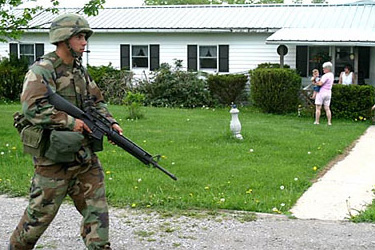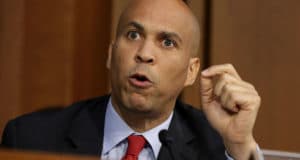The United States military has essentially authorized itself increased authority over civil disturbances. Changes to a largely unknown piece of US Code entitled “Defense Support of Civilian Law Enforcement Agencies” was altered on May 20. The military now has the power to “police the streets” without consent by either state or local officials. The 2013 adjustment to the code was the first significant change to the statute in more than 200 years.
An excerpt from the change to the Defense Support of Civilian Law Enforcement Agencies reads:
“Federal military commanders have the authority, in extraordinary emergency circumstances where prior authorization by the President is impossible and duly constituted local authorities are unable to control the situation, to engage temporarily in activities that are necessary to quell large-scale, unexpected civil disturbances.”
In our modern world, it is difficult to imagine a time when the president of the United States would not be reachable by phone or email. If a solar flare, EMP attack, or cyber attack on the power grid did render communication impossible, the military would now have the authority to intervene if “civil disturbances” broke out.
Blurring the lines between civilian law enforcement and military authority is a very slippery slope indeed. During the manhunt for the Boston Marathon bombing suspects, it was extremely difficult to tell a well-trained and well-armed soldier from a member of the SWAT team. Watching military tanks roll along the streets of Boston was a very startling sight for many. Balancing civil liberties with the need to protect the public while on a manhunt for terrorists was surely an extremely difficult task for all the agencies involved. But, it is especially important that during such times Constitutional protections are not discarded. Even when we are tested as a nation during an emergency situation, trampling upon the principles laid out by the Founding Fathers should never be an option.
Bombshell New Book Reveals… How To Survive The Coming Martial Law In America
The brave men and women who put their lives on the line to protect the Constitution always deserve out upmost respect. Concerns about government overreach into the civilian realm do not diminish the reverence in which any patriot holds our Armed Forces. Our fighting men and women should never be placed in a position which puts them at odds with their commanders over orders which would infringe upon the Constitution.
We may very well need the military to help during large-scale civil unrest. A dedicated soldier worried about his own family could be the only thing standing between your home and the marauding hordes. Yet, even though we might be thankful to see a military tank cruising along the cul-de-sac, infringing upon state and local powers, and the ability of citizens to bear arms to protect themselves is not an acceptable option.
The Defense Support of Civilian Law Enforcement Agencies authority change does absolutely nothing to squelch fears about FEMA camps and martial law being imposed.
Rutgers University constitutional law professor and civil liberties attorney Bruce Afran has this to say about the new civil powers of the United States military:
“It’s quite shocking actually because it violates the long-standing presumption that the military is under civilian control. It’s a wanton power grab by the military. It’s no different than the emergency powers clause in the Weimar constitution [of the German Reich]. It’s a grant of emergency power to the military to rule over parts of the country at their own discretion.”
An unnamed defense official told the media that the military authority in relations to civil disturbances has been in existence for more than a century, but hasn’t been exercised. The unidentified individual also maintained that the Pentagon does not want to be involved with law enforcement in the civilian arena. The man also had this to say about the military policing American cities:
“It’s one of those red lines that the military hasn’t signed up for. Every person in the military swears an oath of allegiance to the Constitution of the United States to defend that Constitution against all enemies foreign and domestic.”
The unnamed defense source also noted that an Armed Forces commander is selected by a board and has completed training relating to the “exercise of command authority.”
I think the authors of the oath may have something entirely different in mind in regards to domestic threats against the Constitution and America. When the Founding Fathers risked their lives to create a new nation, they wanted to make sure that America would be a true Republic and governed by the will of the people. Concerns that the government would become too large and powerful were in the forefront of their minds. Thomas Jefferson would have to squint to even recognize the America we are living in today.
One of the aspects of the Defense Support of Civilian Law Enforcement Agencies code change which has many citizens concerned is the lack of clarity in the language. The alteration to the code does not clearly define under what circumstances would the lack of presidential availability shift civil containment powers to military commanders. The wording does not appear to take into consideration the established chain of authority in the event that a sitting president is unavailable.
 Exactly what constitutes a civil disturbance scenario which can fall under the control of the military also appears to be left up to conjecture. An Armed Forces commander must use his (or her) best judgment to determine if a civil unrest situation shows signs of “conspiracy that hinders the execution of state or federal law,” “wanton destruction of property,” or domestic violence. Under such criteria, the shenanigans which have occurred after a sports win or loss could qualify for potential military involvement.
Exactly what constitutes a civil disturbance scenario which can fall under the control of the military also appears to be left up to conjecture. An Armed Forces commander must use his (or her) best judgment to determine if a civil unrest situation shows signs of “conspiracy that hinders the execution of state or federal law,” “wanton destruction of property,” or domestic violence. Under such criteria, the shenanigans which have occurred after a sports win or loss could qualify for potential military involvement.
The Article IV of the Constitution says that the United States military cannot become involved in domestic problems unless the violence reaches a level which threatens the application of federal law or the governance of a state. Both the Insurrection Act of 1807 and the Posse Comitatus Act of 1878 further clarified the strict set of circumstances required before the Armed Forces can intercede in domestic disturbances. If the civil unrest involves a single state, consent from the governor has always been required before federal troops can be deployed – but perhaps not any longer.
 Off The Grid News Better Ideas For Off The Grid Living
Off The Grid News Better Ideas For Off The Grid Living





